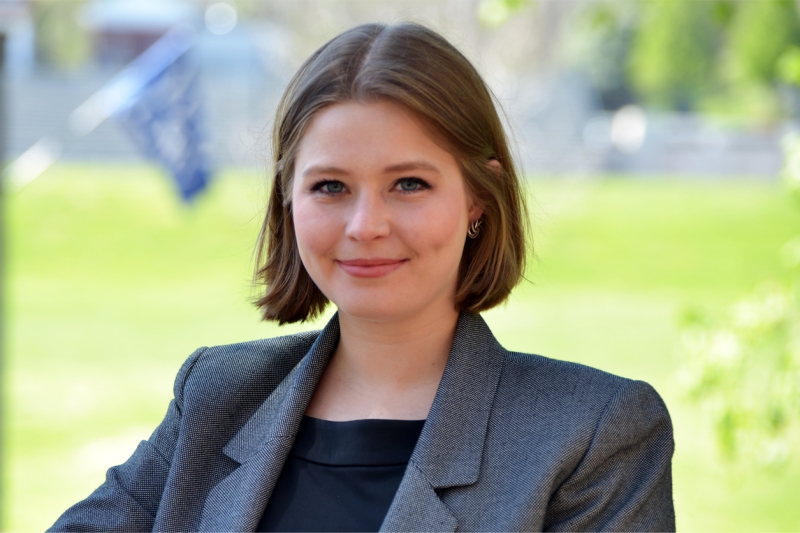More than a Number In the Rights of Prisoners practicum, Courtney Ebersohl '24L urges the Virginia Parole Board to see past the crime.
Courtney Ebersohl ‘24L is from Fairfax County, Virginia. She attended Virginia Polytechnic Institute and State University, where she received a B.A. in History, a B.A. in French, and a minor in Art History. After college, she was a paralegal in Washington, D.C. At W&L, she is on the Washington and Lee Law Review and is the Treasurer of the Public Defense Group. She enjoys hiking with her partner and running on the Chessie Nature Trail.
Why did you choose to participate in this practicum for your 2L year?
I wanted to take courses that would teach me how to challenge the criminal justice system’s pervasive dehumanization of people who are accused and convicted of crimes. The Rights of Prisoners Practicum provided that opportunity, and more. In the Rights of Prisoners Practicum, each student represents a currently incarcerated person in Virginia in their application for parole. As a student representative, your main goal is to show the Virginia Parole Board that your client is a human being who deserves a second chance. The Virginia Parole Board does not know much about your client. The Board members know your client’s Department of Corrections number and their criminal history. It’s your job, as an advocate, to show the Board that your client is much more than a number and their conviction. I chose to participate in this practicum because I wanted to be someone’s advocate and to contribute to a greater movement of advocacy for incarcerated people in Virginia.
What classes have prepared you to work in the practicum?
My first-year Legal Writing course provided me with the skills to write my client’s parole package persuasively. Criminal Procedure also helped me understand the process underlying my client’s conviction, but criminal courses are not necessary to effectively represent your client.
What are some skills you have developed in this course?
I developed skills in interviewing, managing expectations, and building trust. Every week I would speak with my client and his supporters. I learned that the best “interviews” are conversations and that confidence is crucial for building trust. I also developed written and oral advocacy skills. The practicum requires you to compile a parole package and advocate for your client in their parole hearing. The writing skills I developed in this practicum were unlike the writing skills I learned in any other course in law school. Your parole package is an opportunity to paint a picture of your client for the Board. Your package includes your client’s life story and reasons why your client deserves parole. You do not include case law or legal arguments. The arguments in your parole package are based on your client’s achievements and character. Considering very few people are granted parole in Virginia, it is crucial that you express your client’s story in a compelling way. Communicating your client’s story persuasively and capturing the reader’s attention are invaluable tools for a successful legal writer!
What surprised you about the work you have done?
I was surprised to learn that I was going to be entirely responsible for my client’s parole application. I would interview my client every week, create his parole package, and present before the Board on my own. At the beginning of the semester, Professor Weiss described the process of Virginia parole and explained what was expected of us. Throughout the semester, she provided exceptional guidance and support while we navigated our client relationships. We met with her every week to discuss our client’s parole packages. She offered suggestions for solutions to problems and empowered the students to implement those solutions. This autonomy allowed me to develop my confidence and to learn how to manage client relationships.
What was your favorite aspect of your work with the practicum?
I will remember my client and his family for the rest of my life because of the meaningful connections we made with each other. We were essentially on a team together, fighting for the same cause. While crafting my client’s parole package, I asked my client and his family members difficult questions about the past. I learned about their lives and the incredible love and support they provide each other. I was honored to be part of my client’s life and his family’s life this year.
What was your biggest challenge so far?
My biggest challenge was managing expectations for my client and his supporters. A parole grant is rare in Virginia. The Virginia Parole Board only grants release to 1-2% of people who are eligible for parole. Parole is an uphill battle, but it is not an impossible one. Conveying this reality to my client and his supporters was difficult. As a student representative, you want to maintain hope. However, you cannot give your client or their loved ones false hope. Walking this delicate line was my biggest challenge.
Has this experience helped you figure out your post graduate plans, and if so how?
This experience reminded me why I am in law school, and it solidified my desire to work in a public defender’s office. As evidenced by parole in Virginia, our criminal justice system is stacked against the accused and provides little opportunity for second chances. I plan on applying the skills I learned to build trust with my future clients and humanize them at every stage of the process.
 Courtney Ebersohl ’24L
Courtney Ebersohl ’24L
You must be logged in to post a comment.